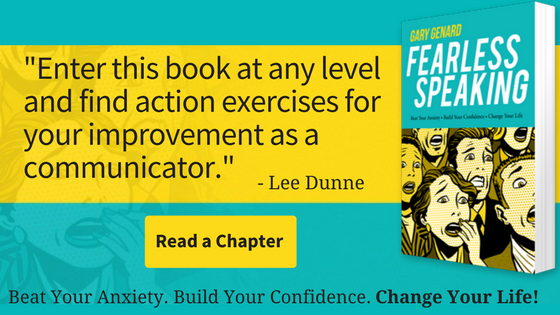
Do you experience stage fright? Here's a great way to get your speeches and presentations off to a strong start so you speak with confidence!
One way or another, most of us experience some form of nervousness at the start of a speech or presentation.
You know what it's like . . . the initial moments of your speech or presentation when everybody is watching you expectantly. Call it the "awful first two minutes."
Want to get in The Zone so you're relaxed yet focused when you start a speech? Discover how to speak with ease and enjoyment, even if you have just 5 minutes to spare! Download my free cheat sheet, "How to Calm Your Nerves Before Speaking."
How Negative Self-Talk Harms Your Public Speaking
Without a doubt, you can be your own worst enemy in terms of building rather than tearing down your confidence as a speaker. While your audience is watching you, for instance, you may be thinking the following, courtesy of your nervousness and speech anxiety:
- Nobody looks the least bit interested.
- Everyone is judging my competence.
- I've suddenly grown these appendages (some people call them "arms") that I don't know what to do with.
- Whatever I was going to say has just flown right out of my head.
- I know the audience can see I'm nervous, and that's making me, well, nervous.
- I'm sure that if there's a Hell, I'm in it!

How to Avoid a Self-Fulfilling Prophecy of Failure
The reality of this situation, however, is quite different. Your audience is actually the most attentive they'll be for your entire presentation. They are expectant—but they want you to succeed. Chances are, for instance, that no one is paying attention to how you're using your arms. And nearly all your nervousness isn't visible to your audience.
In other words, you're doing fine! Woody Allen once said that 80 percent of success is just showing up—and just by being here speaking, you've got that covered. So you can relax.
Easier said than done, huh?
Yet there are two tried-and-true ways you can avoid the self-fulfilling prophecy of a speech that starts out disastrously in that all-important opening when you're most nervous. The first method has to do with your attitude, and the second utilizes a few simple skills.
Looking for a guide to great openings? You'll find everything you need in my essential e-book for launching your presentations with clarity and impact. Learn the 5 speech tools you need to grab your audience and get them instantly engaged. It's all in my practical e-guide, "How to Start a Speech."
How to Establish Rapport with an Audience
You make things much worse for yourself if you view the audience as the enemy and try to stage a retreat. The truth is, you can't retreat. You're here to give a presentation, and running out of the room just isn't an option. By thinking of yourself as apart from the needs of your listeners, you're putting yourself in a situation that denies reality and makes it impossible for you to succeed.
So embrace your audience instead. You're in that room or auditorium to share something of mutual interest with these people. For their part, they're genuinely interested in what you have to say. To guarantee that that's the case, learn how to perform an audience analysis so you know their needs. Accept that reality and simply talk to them. They're on your side.
Audiences feel fulfilled when speakers succeed, and terrible when they don't. So don't try to be excellent; simply do your best to share your ideas with your listeners. If you proceed like this, you'll lift a huge weight off your shoulders, and the situation will become enjoyable.
Use Diaphragmatic Breathing and Movement!
Along with your new attitude, arm yourself with a trio of skills that will add a physical dimension to your comfort and confidence. The first skill is diaphragmatic or "belly breathing," to counter the shallow, rapid breathing that accompanies speech anxiety. Remind yourself to breathe more deeply and slowly, which will calm your heart rate and oxygenate your brain.
Once you're breathing fully and diaphragmatically, work on the physical dimension of your presence. Stand with your feet at armpit width, and "ground" yourself, i.e., assume a steadfast stance to give yourself stability and the feeling of the solid earth under your feet. Once you've set yourself, you can use your strong position to move appropriately.
Movement has a number of advantages, including releasing tension and the "trapped" feeling anxiety brings with it. It also adds a visual dimension for your audience. And if you move to a different spot for each main point, your positions will help audiences retain those points.
Finally, it just feels good to use a stage to deliver a performance.
Isn't that better than enduring two minutes of pure hell?
You should follow me on Twitter here.



